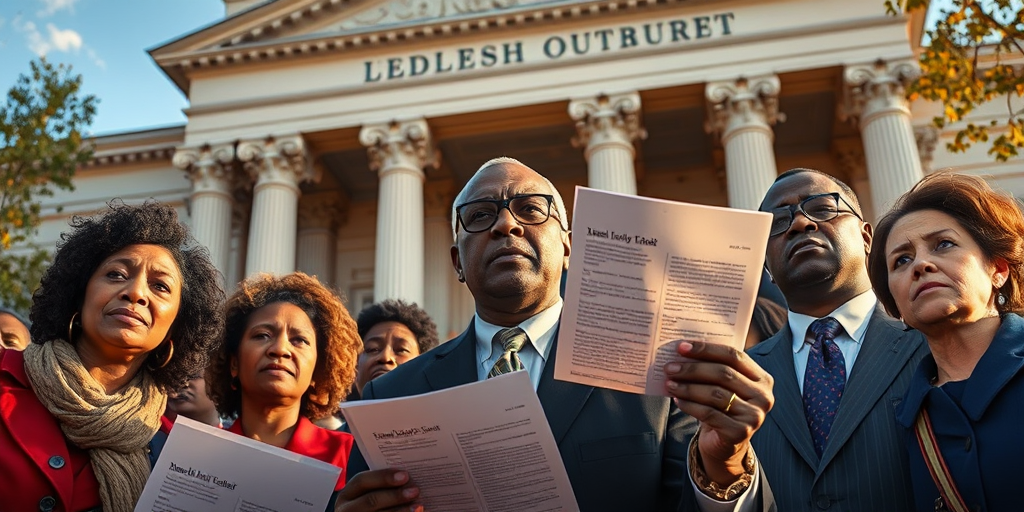Coalition Sues to Stop Mississippi’s New Anti-Diversity Law
A coalition of civil rights organizations, including the ACLU of Mississippi and the Mississippi Center for Justice, has filed a federal lawsuit challenging Mississippi’s new legislation, House Bill 1193. Signed into law on April 14, 2025, by Governor Tate Reeves, the law is set to take effect on July 1, 2025. Critics argue that this anti-diversity, equity, and inclusion (DEI) law infringes on the First and 14th Amendments of the U.S. Constitution, accusing it of stifling educational freedom and censoring essential historical and social topics.
A Closer Look at House Bill 1193
The legislation, crafted by Representative Joey Hood, a Republican from Ackerman, prohibits public and state-accredited nonpublic schools from requiring diversity statements or conducting DEI training during hiring or admissions processes. Critics of the bill claim it censors discussions on significant topics such as slavery, the civil rights movement, and LGBTQ rights. These restrictions, they argue, prevent educational institutions from fostering an environment of open expression and truth-telling in Mississippi, a state with a complex and significant history in civil rights.
Amir Badat, a civil rights attorney from Mississippi, expressed concerns about the law’s broader implications: “HB 1193 is an attack on truth and on the freedom to confront historical and present-day realities in Mississippi,” he stated. “When our educators are afraid to teach and students are denied learning opportunities, we cannot progress as a society.”
Local Impact and Community Response
The potential local impact of the law in Mississippi is profound. Educational institutions, a fundamental part of community life, could see a significant shift in operational policies, potentially affecting curricula and hiring practices. The law requires schools to establish complaint procedures for alleged violations, yet it does not clearly define these processes. Critics worry about potential ambiguity and misinterpretations that could deter educational openness and result in punitive measures against educators.
“These undefined procedures create an environment of uncertainty,” said James Thomas, an associate professor at the University of Mississippi, and one of the plaintiffs. “Educators need to navigate unclear guidelines while fostering an inclusive and comprehensive learning setting for all students.”
Connecting to Broader National Trends
The lawsuit against House Bill 1193 is a part of a broader national dialogue, as various states have introduced legislation perceived to constrain educational content regarding certain historical and social issues. Educational and civil rights advocates nationwide are championing the call for open discourse and comprehensive education regarding America’s multifaceted history.
In the environment of mounting national concern over such legislation, Mississippi’s case could set a precedent for similar legal disputes elsewhere. The coalition behind the federal lawsuit seeks injunctive and declaratory relief, aiming to protect educational liberties by challenging the restrictions imposed by HB 1193.
Perspectives on DEI Legislation
Not all reactions to the law have been negative. Proponents argue that it ensures fair treatment within educational and hiring processes. Representative Hood articulated during the legislative session that the bill does not aim to limit free speech but instead to eliminate certain divisive concepts from becoming requisite elements in academic settings.
“We’re committed to ensuring our educational institutions uphold a non-divisive environment,” Hood stated. “This legislation assures that everyone is treated equally, regardless of race, gender, or background.”
However, opponents maintain that the bill’s vagueness is precisely its problem, potentially leading to reduced engagement with crucial historical contexts. Without explicit guidelines, the boundaries of legal norms remain open to interpretation, causing apprehension among educators.
Community Resources and Moving Forward
As the lawsuit progresses, community engagement remains pivotal. Organizations involved in the legal challenge are planning informational events to educate the public about the implications of House Bill 1193 and the lawsuit’s objectives. In addition, the public is encouraged to engage in dialogue with educational boards and legislators, ensuring their voices contribute to shaping inclusive educational policies.
For more information, residents can contact involved organizations like the ACLU of Mississippi or the Mississippi Center for Justice for guidance and support. The Mississippi Free Press continues to deliver ongoing updates and insights into the lawsuit and the evolving political landscape around educational freedom.
Conclusion
As Mississippi grapples with House Bill 1193’s impacts, its outcome might influence not only local educational directives but also reflect broader national trends regarding diversity and inclusion in academia. Through this lawsuit, involved parties advocate for educational environments representative of diverse perspectives and historical accuracy, reinforcing Mississippi’s connection to a continuously evolving narrative of civil rights and societal change.







